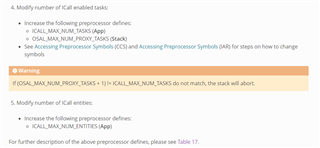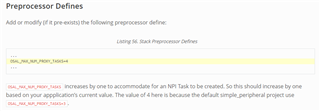Other Parts Discussed in Thread: BLE-STACK
Hi!
Raising this again:
From dev.ti.com/.../creating-a-custom-bluetooth-low-energy-application.html

This is all well and good...
except it points us to Table 17 at https://dev.ti.com/tirex/explore/content/simplelink_cc2640r2_sdk_5_10_00_02/docs/blestack/ble_user_guide/html/ble-stack-3.x/stack-configuration.html#stackconfigurablefeatures which still says
So, to get to the bottom of this, do I understand it correctly:
- ICall tasks in the app can use ICall to communicate to and synchronise with each other as well as the stack, so ICALL_MAX_NUM_TASKS must be the amount of tasks there;
- While on the Stack side, OSAL_MAX_NUM_PROXY_TASKS only refers to tasks on the app side that actually call stack (Bluetooth) functions?
- And as on the app side, the BLE-Stack is itself a task, by default ICALL_MAX_NUM_TASKS needs to be OSAL_MAX_NUM_PROXY_TASKS+1.
- If we want to add a task that uses ICall to allocate dynamic memory or synchronise with some other task besides BLE-Stack, we have to increase ICALL_MAX_NUM_TASKS, but not OSAL_MAX_NUM_PROXY_TASKS?
Please point out misunderstood points, I guess? And fix the documentation.



